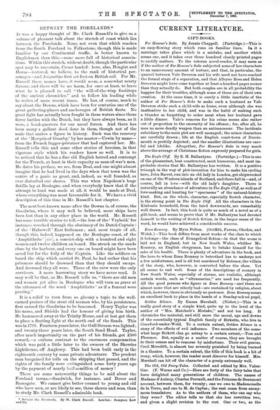BETWIXT THE FORELANDS.*
IT was a happy thought of Mr. Clark Russell's to give us a volume of pleasant talk about the stretch of coast which lies between the Forelands. None, not even that which reaches from the South Foreland to Folkestone, though this is made familiar by our Continental traffic, is better known to Englishmen than this,—none more full of historical associa- tions. Within this stretch, without doubt, though the particular spot may be uncertain, Caesar landed : here, also, Hengist and Horsa—restored, we believe, to the rank of historical per- sonages—and Augustine first set foot on British soil. For Mr. Russell these names have, it would seem, a somewhat musty flavour, and there will be no harm, for once at least, to leave what he is pleased to call " the will-of-the-wisp footsteps of the ancient chronicler," and to follow his leading while he writes of more recent times. He has, of course, much to say about the Downs, which have been for centuries one of the great gathering-places and anchorages of British fleets. No great fight has actually been fought in these waters since those fierce battles with the Dutch, but they have always been, as it were, a head-quarters for our naval forces. And there has been many a gallant deed done in them, though not of the scale that makes a figure in history. Such was the recovery of the Marquis of Granby,' by her master—Urwin by name— from the French lugger-privateer that had captured her. Mr. Russell tells this and some other stories of heroism, in that vigorous style which his readers know so well. It is to he noticed that he has a fine old English hatred and contempt for theTrench, at least in their capacity as man-of-war's men. He dates his preface, we see, from Deal, and one might almost imagine that he had lived in the days when that town was the centre of a panic as great, and, indeed, as well founded, as ever disturbed our shores. This was when Napoleon's huge flotilla lay at Boulogne, and when everybody knew that if the attempt to land was made at all, it would be made at Deal, where everything was most favourable for it. We have a vivid description of this time in Mr. Russell's last chapter.
The next best-known name after the Downs is, of course, the Goodwins, where it may well be believed, more ships have been lost than in any other place in the world. Mr. Russell has some terrible stories to tell,—the loss of the' Vryheid,' for instance, wrecked through the obstinacy of its Dutch Captain ; of the ' Halsewell ' East Indiaman ; and, most tragic of all, though this, indeed, happened on the Boulogne coast, of the ' Amphithrite ' [sic], a convict-ship with a hundred and eight women and twelve children on board. She struck on the sands close by the harbour, and every one on board might have been saved but for the folly of the Captain. Like the soldiers on board the ship which carried St. Paul, he had rather tbat his prisoners should be drowned than that they should escape. And drowned they all were. Three of the crew were the only survivors. A more harrowing story we have never read. It may w ell be that, as Mr. Russell tells us, " there are old men and women yet alive in Boulogne who will turn as grave at the utterance of the word Amphithrite ' as if a funeral were passing."
It is a relief to turn from so gloomy a topic to the well- earned praises of the stout old seaman who, by his persistence, first caused the Goodwins to be beaconed. Henry Taylor was his name, and Shields had the honour of giving him birth. He hammered away at the Trinity House, and at last got them to place a floating light at the north end of the Sands. This was in 1795. Fourteen years later, the Gull Stream was lighted ; and twenty-three years later, the South Sand Head. Taylor, after much importunity on the part of his friends, got £500 reward,—a curious contrast to the enormous compensation which was paid a little later to the owners of the Skerries -Lighthouse, off Anglesey. This had been built early in the eighteenth century by some private adventurer. The prudent man bargained for tolls on the shipping that passed, and the rights of the family were extinguished some forty years ago by the payment of nearly half-a-million of money !
There are some noteworthy things to be said about the Foreland towns,—Sandwich, for instance, and Dover and Ramsgate. We cannot give better counsel to young and old who have seen, or are likely to see, these shores and seas, than to study Mr. Clark Russell's admirable book.
Betwixt the Forelands. By W. Clark Russell. London : Sampson Low and Co.






















































 Previous page
Previous page